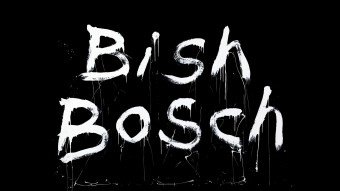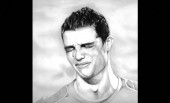You may remember Rachel Zeffira as the female half of Cat’s Eyes (Faris Badwan of the Horrors was her male foil), who put out an album of cinematic pop last year. “The Deserters”, Zeffira’s first solo release, is a very different beast. Piano dominates the album along with orchestral instruments like the harp and oboe (all played by the Canadian herself), and it doesn’t sound like a lost girl group record from the sixties – although it doesn’t sound like it’s particularly ‘now’ either. When a cor anglais appears among the legato piano arpeggios of the opening title track, it’s clear we are very much in the realms of ‘adult pop’.
Faris is nowhere to be seen, but his mates TOY throw in a helping hand on ‘Here On In’ (along with SCUM drummer Melissa Rigby). The track begins with one of their standard issue krautrock beats, but their sound is softened by Zeffira’s voice and arrangements, while the dreamy backing vocals they provide complement her part perfectly. Despite being the only song on the album to feature guitar, and one of the few to feature prominent percussion, it still exudes calmness and restraint.
The word restraint sums up the album, despite the fact that Zeffira is a classically-trained soprano (she was set to attend one of England’s top opera schools before being accidentally deported) and utilises some grand orchestral arrangements. “As soon as I have a bit of money I seem to blow it all at Abbey Road,” she admits, but the lofty production and instrumentation is rarely overblown. The more operatic moments tend to subtly slink in as backing vocals, while the lead parts are usually breathy and composed. Zeffira’s method provides a relaxing ying to fellow goth-tinged pianist Soap & Skin’s harrowing yang.
Occasionally it’s a little too restrained. The rippling piano on ‘Silver City Days’ is certainly pretty but also pretty forgettable, while ‘Front Door’ is, to be frank, sentimental rubbish. ‘Star’ fares better, driven by a pulse as delicate as a baby’s heartbeat, but even here it sounds like it might have drifted out of a new age cafe in Totnes. The gentle clack of middle-aged knitting in my imagination almost threatened to overpower the quiet thump of the track itself.
Fortunately things pick up before the end. A cover of My Bloody Valentine’s ‘To Here Knows When’ manages to sound more like Nick Drake in a wistfully upbeat mood, while the closing track, ‘Goodbye Devine’, makes excellent use of a cathedral organ (a cathedral organ, you hear! None of your shoddy church crap), which not only adds some much-needed colour but also builds to a triumphant resolving major chord at the end.
It brings a satisfying conclusion to proceedings, but you do wonder whether the album would’ve been more interesting if TOY had been co-stars rather than just offering cameos; the combination seems to bring out the best of both parties. While Zeffira is an outrageously talented musician, you’re ironically left with the feeling “The Deserters” could’ve done with more recruits…
.






Follow us
Follow us on Facebook Follow us on Twitter Follow us on Google+ Subscribe our newsletter Add us to your feeds